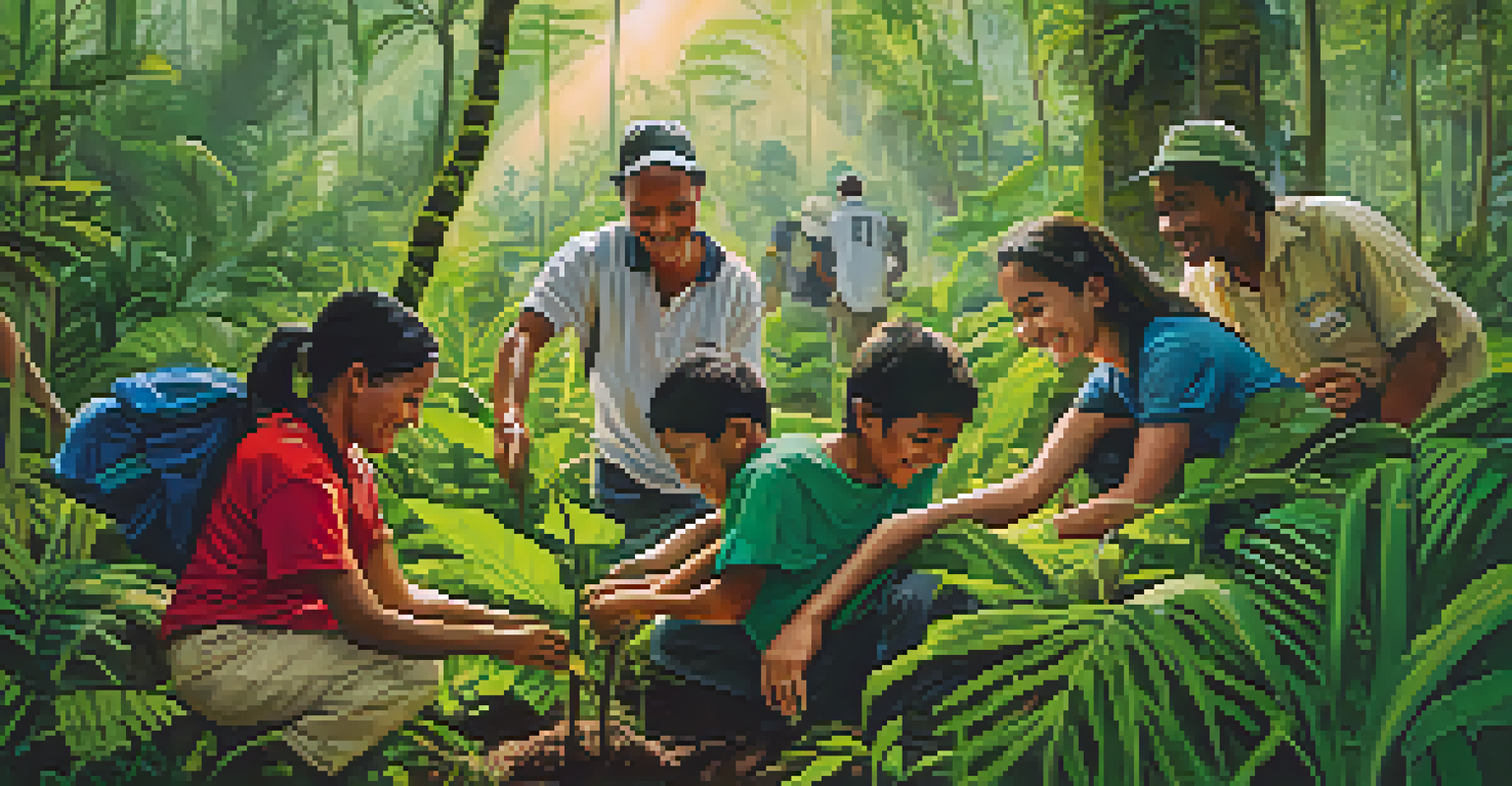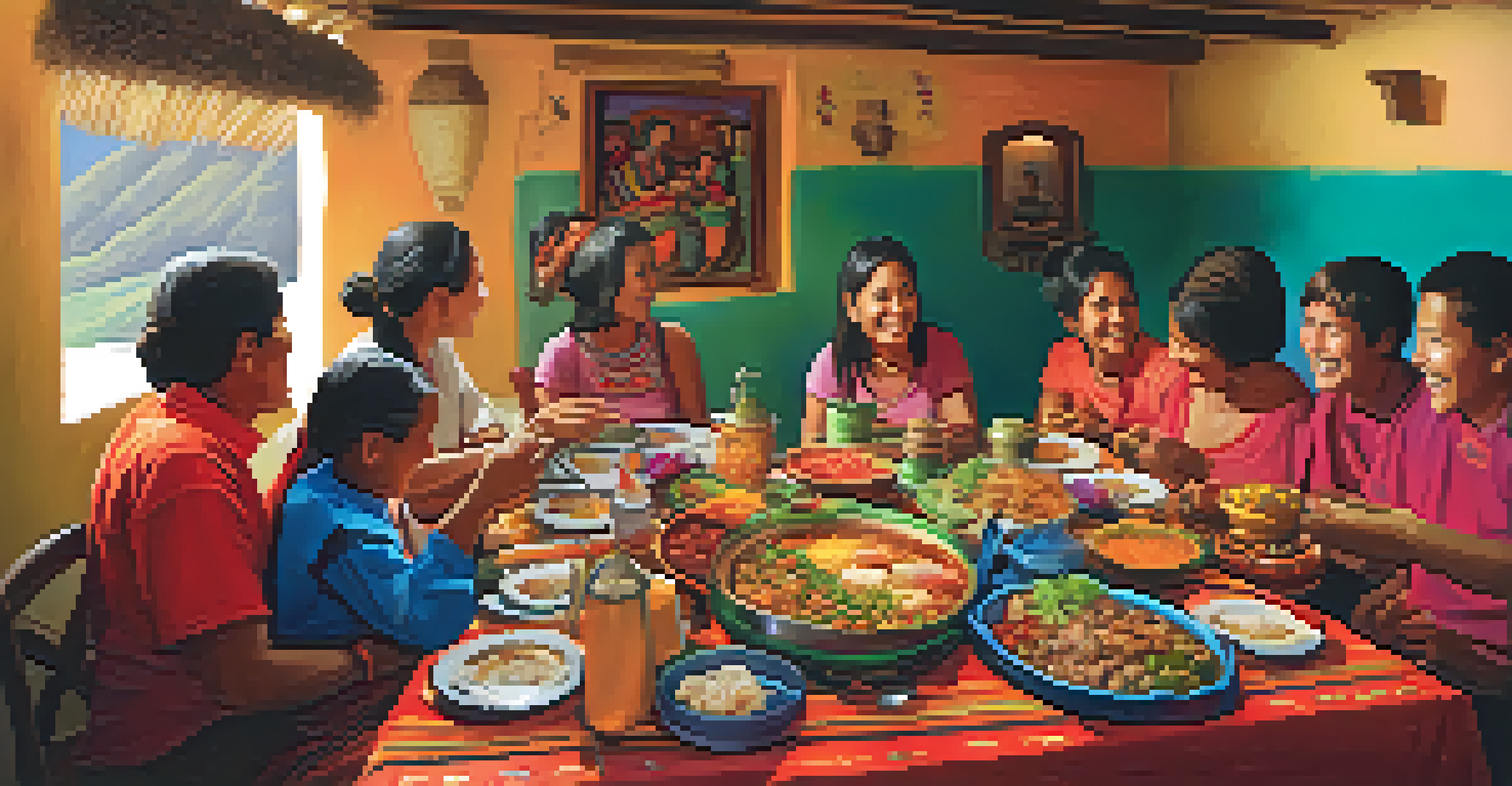How Volunteer Tourism Benefits Local Communities in Peru

Understanding Volunteer Tourism and Its Purpose
Volunteer tourism, often called 'voluntourism,' combines travel with community service. It allows travelers to give back while experiencing new cultures. In Peru, this approach offers a unique opportunity for individuals to engage with local communities meaningfully.
The best way to find yourself is to lose yourself in the service of others.
Many volunteers participate in projects such as education, conservation, and healthcare. These efforts not only help address immediate community needs but also foster cultural exchange. Volunteers often leave with a greater understanding of the challenges faced by local residents.
Ultimately, the goal of volunteer tourism is to create a win-win situation, where both volunteers and communities benefit. This reciprocal relationship can lead to lasting connections and positive changes within the region.
Economic Benefits for Local Communities
One of the most significant advantages of volunteer tourism is its economic impact. When volunteers arrive, they often spend money on local accommodations, food, and activities. This influx of cash helps support local businesses and create jobs.

Moreover, many volunteer programs invest funds directly into community projects. This financial support can lead to improvements in infrastructure, education, and healthcare, which in turn enhances the overall quality of life for residents.
Voluntourism Enhances Local Economies
The economic impact of volunteer tourism supports local businesses and improves community infrastructure.
As the local economy grows, communities become more resilient and self-sufficient. This sustainable economic development helps ensure that the benefits of tourism are felt for years to come.
Cultural Exchange and Understanding
Volunteer tourism fosters cultural exchange, allowing volunteers to immerse themselves in Peruvian culture. This interaction helps break down stereotypes and promotes mutual understanding between visitors and locals. Such exchanges can be enriching for both parties involved.
Traveling – it leaves you speechless, then turns you into a storyteller.
Through shared experiences, volunteers often develop friendships with community members. These connections can lead to a deeper appreciation of local customs, traditions, and values, enhancing the travel experience.
Cultural exchange also benefits the local community by increasing awareness of their unique heritage. This pride in their culture can inspire locals to preserve their traditions and pass them on to future generations.
Education Opportunities for Local Youth
Many volunteer programs focus on education, providing valuable resources and support for local schools. Volunteers often assist teachers, tutor students, or help develop educational materials. This support can significantly improve the quality of education in underserved areas.
By engaging with local youth, volunteers also inspire and motivate students to pursue their dreams. These interactions can lead to increased aspirations and help young people envision a brighter future.
Cultural Exchange Enriches Experiences
Volunteer tourism fosters meaningful cultural interactions that benefit both visitors and local communities.
Furthermore, educational initiatives funded by volunteer tourism can create opportunities for locals to gain skills relevant to the job market. This not only benefits individuals but also strengthens the community as a whole.
Environmental Conservation Efforts
Peru is home to diverse ecosystems, but many are at risk due to human activity. Volunteer tourism often includes conservation projects aimed at protecting these natural resources. Volunteers may participate in reforestation, wildlife protection, or environmental education initiatives.
These efforts help raise awareness about the importance of preserving the environment. Volunteers learn about local ecosystems while contributing to sustainable practices that benefit both nature and communities.
Involving locals in conservation projects fosters a sense of stewardship for their environment. When community members see the tangible benefits of protecting their natural resources, they are more likely to engage in sustainable practices.
Strengthening Community Bonds
Volunteer tourism can bring communities together, fostering collaboration and unity. When volunteers and locals work side by side on projects, they build strong relationships based on shared goals. This teamwork can lead to increased social cohesion and support networks within the community.
Moreover, as communities witness the positive impact of volunteer efforts, they may become more engaged in future initiatives. This sense of ownership encourages collaboration among residents, creating a culture of mutual support.
Education and Conservation Initiatives
Volunteer programs focus on education and environmental conservation, empowering locals and preserving natural resources.
Ultimately, stronger community bonds lead to greater resilience. When challenges arise, communities that work together are better equipped to overcome obstacles.
Challenges and Considerations for Volunteer Tourism
While volunteer tourism has many benefits, it also presents challenges that must be addressed. One concern is the risk of 'voluntourism' becoming more about the volunteer experience than the needs of the community. Programs must prioritize the interests and input of local residents.
Additionally, it's essential for volunteers to be aware of their impact. Unintended consequences, such as dependency on foreign aid, can arise if volunteer efforts are not sustainable. Programs should focus on empowering communities rather than creating reliance.

By addressing these challenges, volunteer tourism can continue to evolve and provide meaningful benefits to both volunteers and the communities they serve.
The Future of Volunteer Tourism in Peru
Looking ahead, the future of volunteer tourism in Peru appears promising. As awareness of its benefits grows, more travelers are seeking meaningful ways to engage with local communities. This interest can drive the development of more sustainable and impactful programs.
Innovations in technology and communication also play a role in shaping the future of volunteer tourism. Digital platforms can connect volunteers with communities more efficiently, streamlining the process and ensuring that needs are met.
Ultimately, by fostering a culture of responsible and ethical volunteer tourism, we can ensure that local communities in Peru continue to thrive and benefit from the generosity of travelers for years to come.